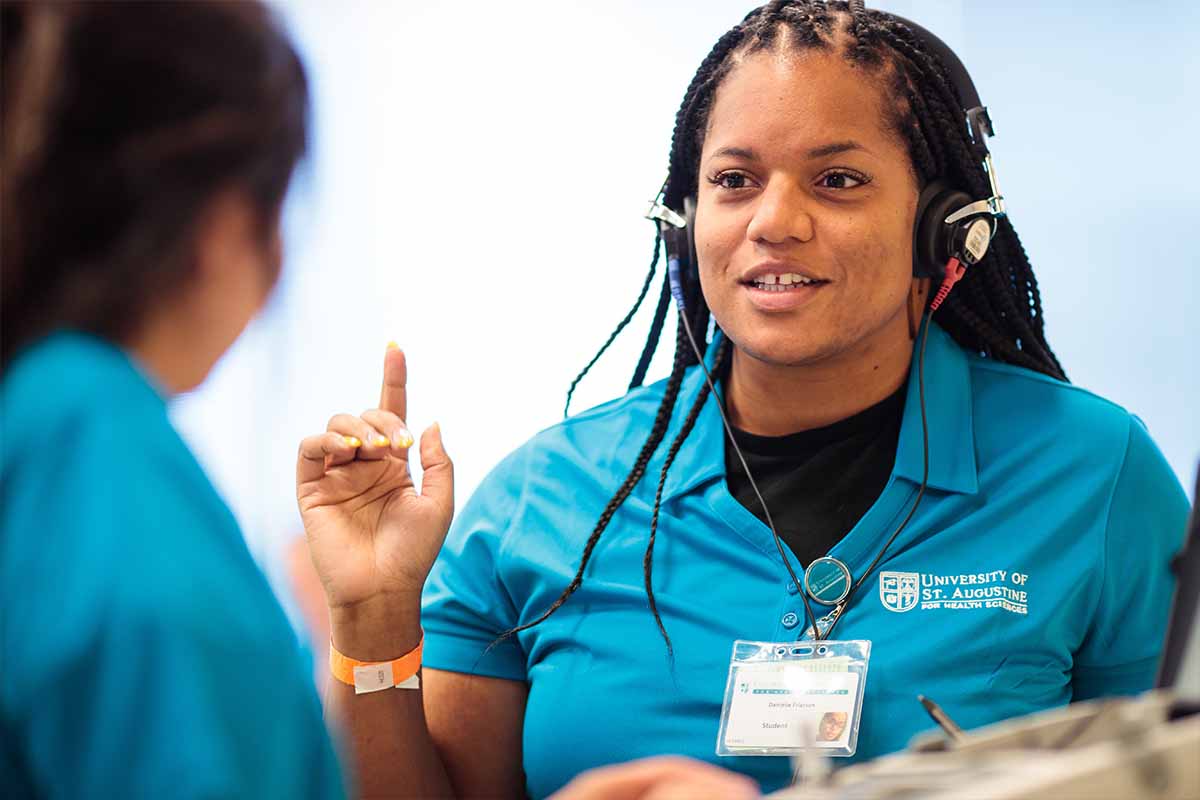“What is the purpose of your life?” That was the resounding question asked by the guest speaker at the inaugural Presidential Distinguished Lecture at the University of St. Augustine for Health Sciences. Vice Admiral Forrest Faison III, M.D. presented “Global Health and the Role of the U.S. Navy” to students and faculty at the St. Augustine campus on Thursday, August 8. Dr. Faison is the 38th Surgeon General of the U.S. Navy and discussed his rewarding career path serving others as a physician, and the vital role that the Navy plays in global health.
“I decided to become a doctor because I wanted to help others. You can be a leader in health care and help our nation. Make that difference for people who may never say thank you to your face but they are there because they need your help, and they are more grateful than you’ll ever know,” he said.
Watch the video recording of the fascinating lecture using the link below.
About the Speaker
Vice Adm. Faison is a native of Norfolk, Virginia, and received his baccalaureate degree from Wake Forest University. He was commissioned in 1980, Faison earned his doctorate degree in medicine and surgery from the Uniformed Services University of the Health Sciences in 1984. He completed post-graduate training in general pediatrics at Naval Hospital San Diego and fellowship training in neurodevelopmental pediatrics at the University of Washington.
Faison served as commander, Navy Medicine West and Naval Medical Center San Diego where he was responsible for medical care and support to over 850,000 eligible beneficiaries by a staff of 16,000 at 10 hospitals and over 30 clinics from the West Coast to the Indian Ocean.
He served as deputy chief, Bureau of Medicine and Surgery, for Current and Future Healthcare Operations; commanding officer Naval Hospital Camp Pendleton; commanding officer, U.S. Expeditionary Medical Facility; and U.S. Medical Task Force, Kuwait. In that role, Faison led a tri-service task force of subordinate commands and was responsible for all healthcare operations in Kuwait, Qatar, and Southern Iraq; including all medical logistics support throughout U.S. Central Command. Faison’s other assignments include deputy commander, Naval Medical Center Portsmouth, Portsmouth, Virginia; Group Surgeon, 3d Force Service Support Group, Fleet Marine Forces, Pacific; director of Department of Defense Telemedicine, Washington, D.C.; chief information officer, Navy Medicine; director, clinical services, U.S. Naval Hospital Yokosuka, Japan; Naval Hospital Lemoore; USS Texas (CGN 39); and Amphibious Group 3.
Faison is board certified and an associate clinical professor in pediatrics and a distinguished professor of military medicine at the Uniformed Services University of the Health Sciences. He has several publications on neurodevelopmental outcomes of premature infants as well as other publications and book chapters on the topics of the future of Wounded Warrior, use of telemedicine and health informatics in healthcare, and value-based care. He is a senior member of the American Associates for Physician Leadership and guest lecturer at Harvard Business School.
Faison served as the deputy surgeon general of the Navy and deputy chief, Bureau of Medicine and Surgery from 2013 to 2015 and began serving as the 38th surgeon general of the Navy Dec. 15, 2015.
In addition to numerous unit and campaign awards, Faison’s personal awards include the Navy Distinguished Service Medal (two awards), Legion of Merit (six awards); Meritorious Service Medal (three awards); Navy and Marine Corps Commendation Medal; and Navy and Marine Corps Achievement Medal. For coordinating Navy Medicine’s support response to Operation Tomodachi, he was awarded the California Medical Community’s Lighthouse Award for visionary leadership and inspiring health innovation; a first for the Department of Defense. Additionally, the Government of Japan awarded Faison the Japanese Maritime Self-Defense Force Commendation Medal for his support and collaboration in medical education and research.










